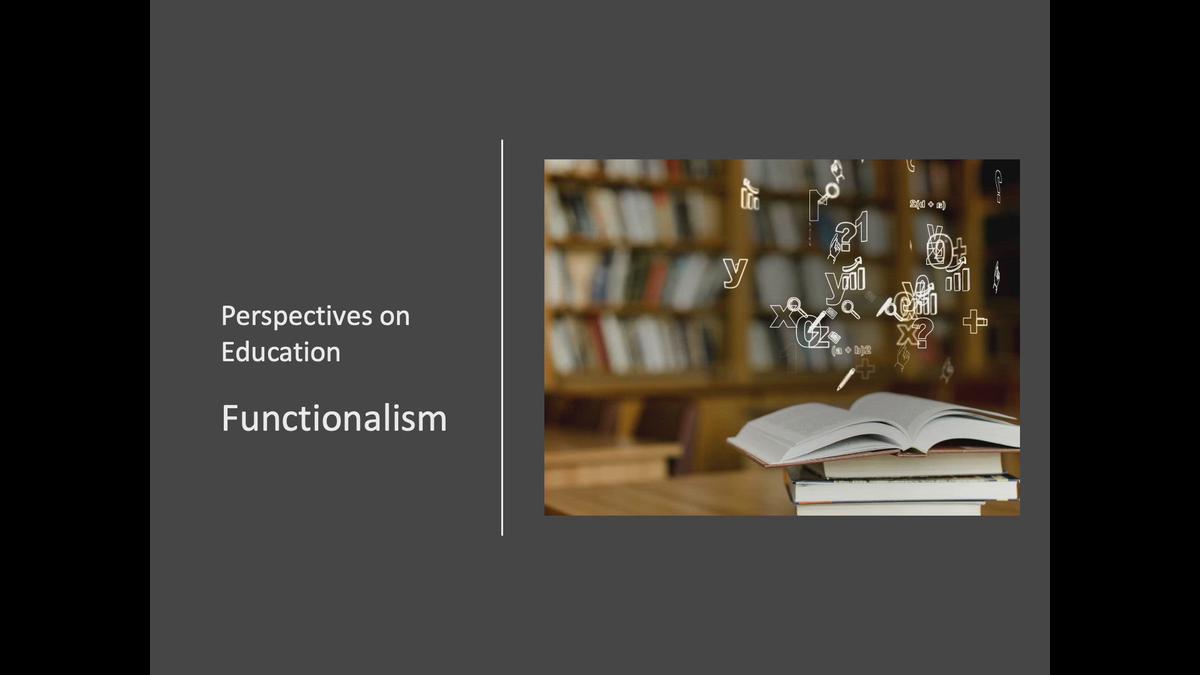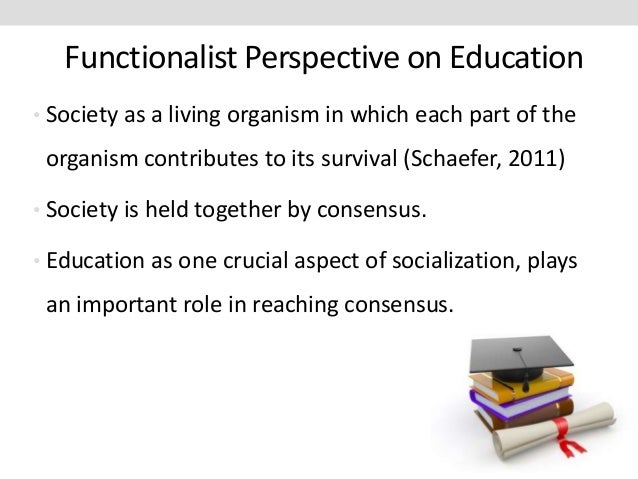Imagine a society without schools. Would we learn the skills necessary for daily life? Would we be able to collaborate effectively and contribute to the common good? The answer, most likely, is no. Education plays a crucial role in shaping individuals and societies, and the functionalist perspective provides a unique lens through which to understand its complexities.

Image: revisesociology.com
The functionalist perspective, a major theoretical framework in sociology, views society as a complex system of interconnected parts working together to maintain stability and order. This perspective emphasizes the contributions of institutions, like education, to the overall functioning of society. By examining how education fulfills various social needs, the functionalist perspective offers valuable insights into the purpose and impact of education on individuals and society as a whole.
The Core Concepts of Functionalism in Education
Socialization: Learning the Ropes of Society
Education serves as a primary agent of socialization, transmitting cultural norms, values, and beliefs to individuals. From a young age, students learn about societal expectations, rules, and appropriate behaviors through interactions with teachers, peers, and the curriculum. This process is essential for integrating individuals into society and ensuring its smooth functioning.
For example, the classroom environment teaches students the importance of punctuality, respect for authority, and cooperation with others. Students also learn about history, literature, and other subjects that contribute to a shared national identity and understanding of the world.
Skill Development: Preparing for the Workforce
Another key function of education is to prepare individuals for the workforce. Schools equip students with the knowledge, skills, and abilities necessary to contribute to the economy and achieve economic success. This includes developing technical skills specific to particular professions, as well as general skills like critical thinking, problem-solving, and communication.
Schools offer a wide range of vocational programs, from carpentry and welding to computer programming and accounting. They also emphasize critical thinking and problem-solving skills, essential for adapting to changing job markets and technological advancements.

Image: cupsoguepictures.com
Social Control: Maintaining Order and Stability
Education plays a role in maintaining social control by instilling values and norms that promote societal order and stability. Schools instill a sense of discipline, respect for authority, and the importance of following rules. This helps to prevent disruption and conflict within society.
For example, students learn about the importance of obeying laws and respecting the rights of others. Schools also provide a structured environment that helps to instill a sense of responsibility and accountability. By promoting these values, education contributes to a more stable and cohesive society.
Social Integration: Bridging Social Divides
Education can help bridge social divides and promote social integration. Schools provide opportunities for individuals from different backgrounds to interact, learn from one another, and develop a sense of shared identity. This can help to reduce prejudice and discrimination and foster a more inclusive society.
Schools often implement programs that promote diversity and inclusivity, fostering understanding and empathy between students from different backgrounds. These programs help students develop a more nuanced understanding of the world and appreciate the richness of different cultures.
Criticisms of the Functionalist Perspective on Education
While the functionalist perspective offers valuable insights into the role of education, it is not without its critics. Some argue that it overly emphasizes the positive contributions of education while ignoring its potential limitations.
The Reproduction of Inequality
One major criticism is that the functionalist perspective fails to adequately address the issue of social inequality. Critics argue that the education system can perpetuate existing inequalities based on factors such as race, class, and gender. Students from disadvantaged backgrounds may lack access to quality education and resources, hindering their opportunities for success.
This inequality can be seen in the unequal distribution of resources across schools, with schools in affluent areas often receiving more funding and offering a more robust curriculum than schools in underprivileged neighborhoods. This disparity can lead to a cycle of disadvantage for students from marginalized communities.
The Hidden Curriculum
Critics also point to the “hidden curriculum” in education, which refers to the unspoken lessons and values that students learn in school. This hidden curriculum can sometimes perpetuate traditional power structures and social norms, potentially contributing to the reproduction of inequality.
For example, traditional classroom structures that emphasize teacher authority and passive learning can limit student agency and critical thinking. These structures may also reinforce gender stereotypes and societal expectations, potentially limiting students’ opportunities and choices.
The Role of Conflict
Functionalist theory focuses on societal consensus and stability, overlooking the role of conflict and power dynamics. Critics argue that schools are not neutral institutions and often reflect the interests of dominant social groups. This can lead to educational policies that privilege certain groups over others.
For instance, the emphasis on standardized testing can disproportionately disadvantage students from certain backgrounds. The curriculum itself can be subject to debates and power struggles, with different groups vying for control over the content and direction of education.
Functionalist Perspective Of Education
Conclusion
The functionalist perspective offers a valuable framework for understanding the role of education in society. It highlights the various ways in which education contributes to social stability, individual development, and the transmission of cultural values. However, it is important to acknowledge the limitations of this perspective, particularly its tendency to overlook issues of inequality and power dynamics. By critically examining both the positive and negative aspects of education, we can gain a more nuanced understanding of its complex and multifaceted role in the modern world.
To delve deeper into the functionalist perspective and explore alternative perspectives, we encourage you to consult additional resources and engage in critical analysis. Share your thoughts and experiences in the comments below, and let’s continue the conversation about the role of education in our lives and society.





